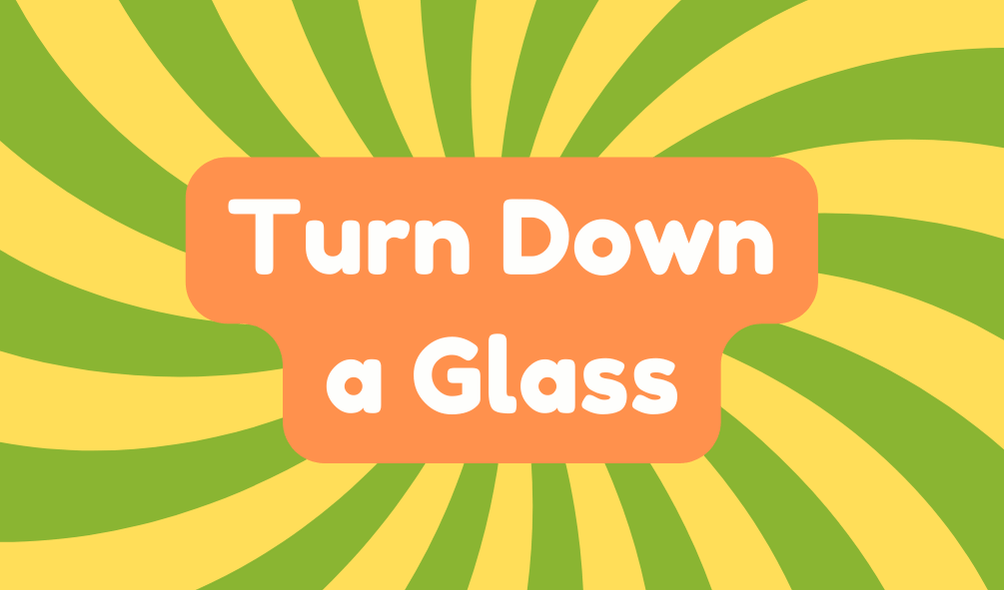When you turn down a glass, it's more than just a rejection; it symbolizes your values and choices. This gesture often reflects a priority for mental well-being and creates space for deeper connections among peers. Historically, the phrase conveys respect and remembrance, serving as an invitation for reflection on life's events. In a world filled with societal pressures, turning down an offer can show mindfulness and self-awareness. It's crucial to recognize this act as a meaningful decision that shapes your life. Curious about its cultural significance and modern applications? There's much more to explore.
Synonyms
When you think about the phrase "turn down a glass," a few synonyms come to mind that convey a similar sense of refusal or rejection. These alternatives carry essential refusal symbolism, underscoring the importance of mindful choices in life. Here are a few examples:
- Decline – opting out can show self-awareness.
- Reject – this informs others you're not on board.
- Dismiss – you're signaling something doesn't align with your values.
- Refuse – a direct way to communicate your boundaries.
Each term encapsulates a unique facet of refusal, reminding you that turning down a glass isn't just a simple act; it's about making meaningful choices. Reflecting on what you accept into your life turns rejection into a powerful statement about your priorities.
Example of Sentences
The phrase "turn down a glass" can illustrate several scenarios in everyday life. This expression reflects various meanings tied to personal choices and social dynamics. Here are a few examples that capture its essence:
- You turn down a glass to prioritize your mental health over social pressure.
- The decision to turn down a glass symbolizes a moment of reflection on important life events.
- Friends notice when you turn down a glass, prompting conversations about deeper connections.
- In certain cultures, turning down a glass serves as a sign of respect and remembrance.
Ultimately, turning down a glass isn't just a refusal—it carries glass symbolism that speaks to your values, choices, and your relationship with the world around you.
Origin
"Turn down a glass" has deep historical roots that enrich its contemporary meaning. This phrase traces back to Jacques Futrelle's poignant farewell to a friend, revealing a heartfelt acknowledgment of loss. It also appears in Napoleon Hill's "Think and Grow Rich," where it emphasizes reflection and choice. The historical context urges us to contemplate the deeper significance behind this act. When you turn a glass upside down, it symbolizes the absence of a companion, turning a simple gesture into a literary reference that invites introspection. Understanding the origin allows you to appreciate how such expressions evolve, teaching us about respect for the past while steering our present. It's crucial to critique these narratives and reimagine their relevance today.
Collocations
Although you might not think about it, "turn down a glass" has several collocations that enrich its usage in conversation. These phrases can enhance your communication by providing depth when discussing refusal gestures and mindfulness practices. Here are a few you might consider:
- Turn down an invitation – This highlights a deliberate choice to prioritize other commitments.
- Turn down an offer – A direct reflection of your boundaries in various situations.
- Turn down the volume – Symbolizing the need for peace and reflection amidst chaos.
- Turn down a challenge – Signifying your decision to step back from something you deem unworthy.
Understanding these collocations can make your discussions more nuanced and impactful, as you articulate your choices with intention and clarity.
How to Use in Everyday Language
Refusing an offer gracefully can often be challenging, but incorporating "turn down a glass" into your everyday conversations can help convey your intentions clearly. When you're turning down a drink or another offer, this phrase brings a cultural ritual to life, signaling both mindfulness and respect. Use it to express that you're prioritizing significant choices over social expectations. For instance, at a gathering, you might say, "Thanks, but I'll turn down a glass; I need to stay focused tonight." This approach not only asserts your decisions but also encourages others to reflect on their own choices. Embracing "turn down a glass" can elevate your communication, making it more meaningful while maneuvering through those tricky moments.
Why Is It Still Relevant Today?
In today's fast-paced world, the concept of "turning down a glass" holds significant relevance as it embodies the art of mindful decision-making. Amidst the chaos, cultural mindfulness encourages you to pause and reflect on your choices. It's easy to get swept up in social dynamics, where pressure can lead to unhealthy decisions. Choosing to turn down a drink or other offers isn't just a personal decision; it's a statement about your values and priorities. In a society increasingly aware of mental health and well-being, this practice can foster deeper connections and respect for individual choices. By embracing this approach, you challenge societal norms while nurturing a healthier, more mindful lifestyle for yourself and those around you.







